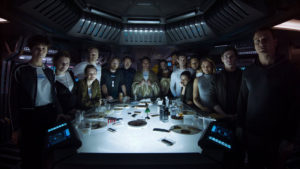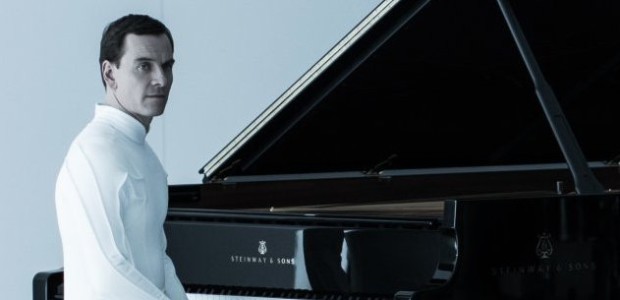“I always had it in there that the God-like creature that you will see is not so nice, and is certainly not God. I’d love to explore where she goes next and what does she do when she gets there, because if it is paradise, paradise cannot be what you think it is. Paradise has a connotation of being extremely sinister and ominous.”
-Sir Ridley Scott
ALIEN: COVENANT is a film about many things: it’s about a search for paradise, it’s about brothers, it’s about the creator and the creator’s creation. It’s a film that is terrifying on a few different levels well before a xenomorph appears on screen.
We begin with a prologue that takes place before the events of PROMETHEUS where Peter Weyland familiarizes himself with his new android creation. He tasks his “son” to play a classical symphony on a grand piano and allows him to name himself. The android slowly walks to Michelangelo’s statue of David standing in the center of the room. We already know that he chooses the name David but now we know the circumstances behind it. Weyland designed David with the ability to create. This causes the unpredictable variable in his programming and possibly the reason why Weyland must familiarize himself with his own creation. The audience is then brought forward several years later and several light years away as a nearly identical android oversees a colonization vessel in deep space. The name of this “advanced” model is Walter, but unlike David he does not have the ability to create.

Walter has the responsibility of the ship’s caretaker as the crew and over 2000 colonists rest in cryo-sleep on their journey to a pre-selected Earth-like paradise. In probably the most breathtaking scene in any of the ALIEN films, the vessel halts it’s journey to raise solar panels, recharging the ship. As expected in a movie of this kind, the serene image of the majestic vessel becomes frighting as a solar flare erupts, damaging the ship and tragically killing the captain. The crew is forced to scramble and improvise the situation as the self-admittedly unqualified first mate becomes captain. During the repair, a rogue transmission is intercepted and determined to be of human origin from an unknown planet of close proximity. Our new captain realizes the planet’s habitability and insists on at least an exploration of this new “paradise.”
As with the quote above, paradise cannot really be paradise as the planet we arrive on is presented as a lush environment with mountains, rivers and greenery yet devoid of any kind of human or animal life. It would seem to be the most perfect destination for a desperate group of colonists on a damaged ship. Why would a world that seems so sustainable of life be so utterly empty of it? Why would there be fields of wheat with no one to harvest it? The crew find out rather quickly as some of them succumb to the hidden effects of the new planet. Some answers are given albeit somewhat unsatisfactory with the arrival of David, the only survivor of the doomed PROMETHEUS mission and the planet’s sole inhabitant.
At the heart of the film is the relationship that occurs between David and his “brother” Walter. Walter isn’t so much treated as a long lost brother as he is a lost dog, following his new friend wondering if he truly even has the ability to learn. Even his ability to love comes under question. Some of the best dialogue occurs as the two walk through the ancient dwelling that David has made his home. Somewhat of a cross between ancient Roman architecture and Anasazi cliff houses. David openly parades Walter and some of the others through rooms and rooms of his gruesome experiments with the black liquid acquired from the ill fated PROMETHEUS mission. How the substance impacts the planet and infects some of the crew members may not be how you think it would.

The theme that seems to run throughout the movie is counterparts. If everyone has or needs a counterpart then how do you react when your counterpart goes missing or has always been missing? Our crew is made up entirely of married couples. In most other work situations this would not logically be the case. Being that this is a colonization mission it’s at least ideal and at most required. It’s not really a spoiler to say that people die in this movie and couples get separated. There’s no “love interests” here. When every character is in love with another character it really raises the stakes when someone is brutally killed. In the average horror movie when a character dies usually no one cares. Often it’s even funny. Here every character is deeply invested in another and to a certain extent each other. David is Walter’s counterpart and you know that that relationship cannot last very long. Hell, even the xenomorph has a counterpart as it needs a human host to merely exist.
If the movie has any flaws it’s the inability to escape the common action sequences of it’s own genre and possibly the implausible stupidity of certain characters. There’s only so many ways you can chase a xenomorph down a hallway and blow it out of an airlock. Characters tend to make stupid decisions. As much as I liked PROMETHEUS, those scientists bumbling around in the ship/cave sequence seemed pretty ridiculous. Here at least when a character does something stupid they admit it in the dialogue. Then again, what kind of astronaut walks on an uncharted planet and lights up a cigar? Wouldn’t that be environmentally unethical? Also, some viewers may not agree with where the writers chose to take certain elements of the story. This is certainly not the optimistic destination that the ending of PROMETHEUS seemed to no doubt hint at to some of the audience.
ALIEN: COVENANT didn’t exactly scare me but then again, few films do. Nevertheless, it is a very very dark and twisted film and a unique addition to the franchise. At least as good as the first two.
-RICH MAIER
Tags: alien, Aliens, Horror, Ridley Scott, Sci-Fi, sigourney weaver, Summer


No Comments